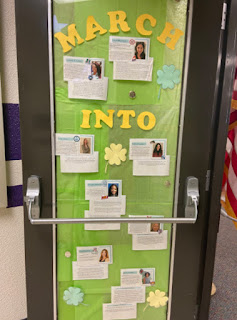Honoring Women’s History Month with Service Learning
One of the proven practices embedded in the Illinois middle and high school course requirements that educators find most daunting is service learning. Educators often equate service learning with volunteerism or community service that requires field trip budgets, transportation, and issues of equity. Service learning, when done well, provides all students the opportunity to apply learning to address issues that matter to them, reaching authentic audiences in their school, local, state, national, and/or global community. It gives all students an opportunity to “do civics” and build social capital while practicing their civic capacities.
The Illinois Democracy Schools Network recently hosted a webinar where three teachers from various regions of the Land of Lincoln shared their journey to incorporate service learning into their classroom practice to facilitate informed action connected to the curriculum. Each of these educators is participating in the Guardians of Democracy Microcredential Program with Volunteer Generation Fund support from Serve Illinois. They are among a group of 26 educators who are facilitating service learning opportunities for classrooms in their region and opportunities for students from various regions and demographic groups to work together for the common good of Illinois.
Barbara Lindauer from Collinsville Unit 10 is a Teach Plus Alumni and her school’s Democracy School Team Leader. Barbara recently engaged her students in celebrating Women’s History month with a local service learning project in which her students created a Google Slideshow/Scrapbook featuring successful female graduates (one for each day of the month) in honor of Women’s History Month. These individuals’ profiles were then made into bulletin boards (see image to left), shared on social media, and one slide is shared each day on their Unit’s web page. The essential question addressed was: “How do you define success?”
We asked Barbara questions to summarize her experience with service learning. We hope you find her responses informative and inspiring!
How did this activity deepen students’ disciplinary content knowledge and/or meet learning targets?
“This activity took place as part of a U.S. History Unit titled: The Time of Upheaval. In this Unit, we explored underrepresented groups and focused on expanding women’s rights. We addressed how women throughout history have broken down barriers and made a difference.”
How did this project deepen students’ knowledge of themselves and their community?
“For some students, this project helped them come to the realization that their present circumstances do not define them. Despite being a school district that has a majority of students receiving free and reduced lunch, many have gone on to Ivy League schools and acquired advanced degrees. In addition, students came to the understanding that there are various measurements of a person’s success.”
What comes next? What did students identify as future opportunities to address this essential question?
“After our project was made public it received so much positive feedback and reached so many stakeholders in our community that the excitement continued to grow. Despite the grading portion of this project passing, students continue to work on collecting and recording data on our graduates in their free time. There is also a planned cross-curricular project in the works for the U.S. History and Theater classes to join forces next year to create podcasts of our graduates.”
Can you share some specific feedback you received from the community?
- “This is an incredible celebration! Thank you for the time and effort you took to celebrate these amazing women and the many others in our community!”
- “As a coach of women student-athletes for the past 20 years, I value greatly being around leaders who lift up and build up!”
- “Thank you for taking the time to compile this list of CUSD#10 accomplished women. This list is truly inspiring. I enjoyed reading all of their accomplishments”
- “Thanks for sharing! I really enjoyed looking through these. It gave me hope again!”
What advice would you give teachers thinking about opportunities for engaging their students in service learning? “My advice to teachers that are thinking about engaging their students in service learning is: Do not feel like your project needs to be some grand gesture. This can be intimidating. Let your students choose, start small and things will grow from there.”
Any other details you would like to share? “I am working on giving up some control of my classroom to students. Let their voices be heard. They will surprise you with their passion and creativity. I am learning to be a facilitator and letting them lead.”
Were you inspired by Barbara’s story? Here are some resources you can use to start your own story with service learning:
- The Illinois Civics Curriculum Design Toolkit has resources for you to help students take informed action.
- The Guardians of Democracy Microcredential program is running cohorts this spring and summer. Visit the website to register your interest.
- You can view the recent Democracy School Webinar, L.E.A.D. with Service Learning to learn more from Barbara and her colleagues to enhance your own practice.
Do you engage your classroom in service learning? Please comment and share your experiences below. Together, we can prepare all students for college, career, and civic life.

